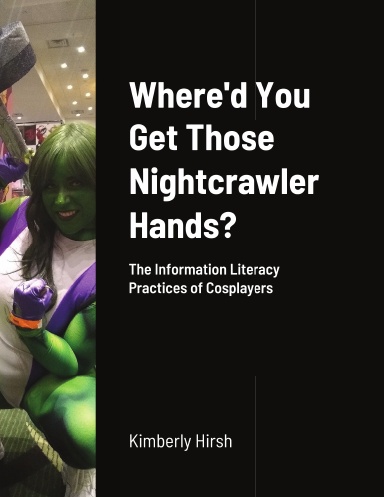For AcWriMoments Day 8, Margy Thomas and Helen Sword encouraged us to trace a lineage of the ideas we work on. I decided to do this with my dissertation because I knew it would be fun, but I didn’t realize how fun.
1984 Kimberly’s mom makes a gorgeous Blue Fairy (from Pinocchio) costume for Kimberly, launching a lifelong delight in dressing up in exquisite costumes (as opposed to whatever’s lying around) and admiring the exquisite costumes of others. Around the same time, Kimberly’s parents take her to the library often.
1988 Kimberly’s dad starts library school. Kimberly hangs out at the library school, a lot. She loves it there.
1994 A guidance counselor who is completely at a loss for what extracurriculars to recommend when she asks Kimberly what she’s into and Kimberly answers, “Reading,” suggests volunteering at the library, so Kimberly does.
1999 W. (then-boyfriend, now-husband) introduces Kimberly to Final Fantasy, a lovely video game series with gorgeous music. O., the then-boyfriend now-husband of one of W.’s housemates, says to Kimberly while they’re in the middle of playing some board game, “You should be a librarian.”
2007 Completely stressed out by being an early career high school teacher, Kimberly starts researching library schools.
2008 W. comes home from work and tells Kimberly that his current boss has inspired him to go to library school so they’re going to library school together.
2009 Kimberly and W. start library school. Kimberly’s advisor is Sandra. Kimberly loves Sandra. Kimberly gets a job as an RA in an outreach program of the School of Education, providing resources and professional development to K-12 educators. (Resources from this department saved her bacon many times when she was a teacher.)
2011 Kimberly gets a job as a school librarian split between two middle schools.
2012 Kimberly’s supervisor from her RA job tells Kimberly, “I’m taking a different job so they’ll be posting this one eventually if you want it.” Kimberly does. The school librarian situation she’s found herself in isn’t what she dreamed of. Eventually Kimberly gets that job and starts working for that outreach program full-time.
2013 Kimberly starts working on projects where she gets to interview teachers about their work. Her office is down the hall from where the School of Ed hosts all of their brown bags and she goes to a lot of them. She decides she wants to pursue a PhD so she can understand what they’re talking about better and maybe publish research about educators’, including school librarians’, good work. She figures she’ll do it part time with the tuition remission she gets as a benefit of her job.
2014 The executive director of the outreach program is fired. (Without cause as far as Kimberly knows.) Kimberly decides that instead of doing the PhD part-time, she’d like to do it full-time, since her program is probably going to be dismantled. She talks to Sandra about the PhD program where she got her master’s in library science and says she wants to work on the library as a place for writing and pop culture engagement. Sandra says there’s a model for this and it’s called Connected Learning. Kimberly applies to the PhD.
2015 Sandra invites Crystle Martin, a scholar of connected learning and leader in the Young Adult Library Services Association, to talk to students at the library school and invites Kimberly to come to the talk and then join them for lunch. Kimberly and Crystle talk about spending way too much time playing video games.
2016 - 2017 Kimberly messes around with different dissertation possibilities. She includes a chapter on gaming and libraries in her comps plan.
2017 Kimberly decides to go to Cosplay America, a costuming convention.
2018 Kimberly starts work on the gaming comps chapter. She attends a Final Fantasy orchestral concert. People have dressed up in gorgeous costumes as characters from the games. They’re so great it kind of makes her want to cry. The next day, she reads Crystle’s dissertation about the information literacy practices of World of Warcraft players. In the conclusion, Crystle suggests that people could replicate her methods to help validate her information literacy model. Kimberly thinks, “I could do that, but with cosplayers!” She bangs out a dissertation prospectus in 2 hours after literal years of hemming and hawing.
2019 Kimberly writes her comps, now with a changed set of chapters. She assembles her committee, including Crystle. She writes a blog post about the process and uses a Final Fantasy screenshot in it. She writes and defends her comps. She writes her proposal in November for AcWriMo. She attends a local con and introduces herself to the cosplay guests, telling them she may contact them to participate in her dissertation.
2020 Kimberly defends her proposal. In freaking February. She has this whole plan that involves going to conventions to talk to cosplayers. AHAHAHAHA. There are no conventions. But she interviews the cosplayers over Zoom.
2020-2021 Kimberly conducts research, scales her design way back, conducts more research, writes, defends, and graduates. She applies for a postdoc at the Connected Learning Lab, where Crystle worked when they first met. She gets the job.
2022-present Kimberly hasn’t touched the cosplay work in a long time but has worked on connected learning in libraries for the whole postdoc.
